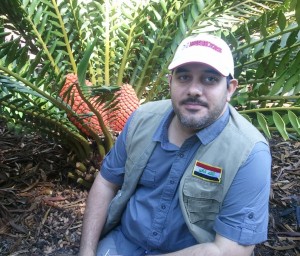
Student Highlight – Maitham A. Al-Sammak is a student in the UNMC College of Public Health (COPH) intercampus Environmental Health, Occupational Health, and Toxicology doctoral program. Maitham is from Baghdad, Iraq, and his education is supported by a scholarship from the Iraqi Ministry of Higher Education and Scientific Research as a part of the Iraqi scholarship program in the United States. Maitham earned both his bachelor’s degree in veterinary medicine and surgery and his master’s degree in pharmacology and toxicology from the University of Baghdad, College of Veterinary Medicine.
Before beginning his doctoral studies, Maitham was a professor in the University of Baghdad College of Science in the Biology Department and a chief researcher in the Tropical Diseases Research Center, Al-Kindi Medical College, University of Baghdad. He led a team of young scientists for five years studying the environmental factors and epidemiology of tropical diseases in Baghdad. Seeing the effect of environmental toxins on public health, Maitham decided to pursue a PhD degree in environmental toxicology, and was encouraged by his Iraqi professors to apply to the UNMC COPH program.
In his doctoral program, Maitham is investigating the presence of algal toxins in the Nebraska freshwater ecosystem. These toxins are thought to target the nervous system, causing serious neurodegenerative diseases such as Lou Gehrig’s disease, Alzheimer’s disease, and Parkinson’s disease. Maitham was the first to detect three algal toxins called “cyano-neurotoxins” – BMAA (β-N-methylamino-L-alanine), DABA (2,4-diaminobutyric acid dihydrochloride), and anatoxin-a — in both Nebraska and Midwestern freshwater ecosystems. His research shows that direct and indirect exposure to these algae neurotoxins could bioaccumulate in water, plants, animals, and humans, causing serious neurodegenerative diseases. Maitham used an animal model to examine the toxic effect of the BMAA cyano-neurotoxin, and he reported, for the first time, how many deaths occurred within 24 hours of administering the toxin and the lowest observed adverse effect level after administering the toxin.
Maitham has found the Environmental Health, Occupational Health, and Toxicology program to be a great fit with his interests. After completing his doctoral program, Maitham plans to return to Iraq and serve his country in the field of public health through his position at the University of Baghdad. His doctoral program has increased his scientific experience and understanding in the field of public health, and he plans to continue to work with his professors at the University of Nebraska-Lincoln and the UNMC COPH after he returns to Iraq, as he will use what he learned in his doctoral program in his career and research in Iraq.

